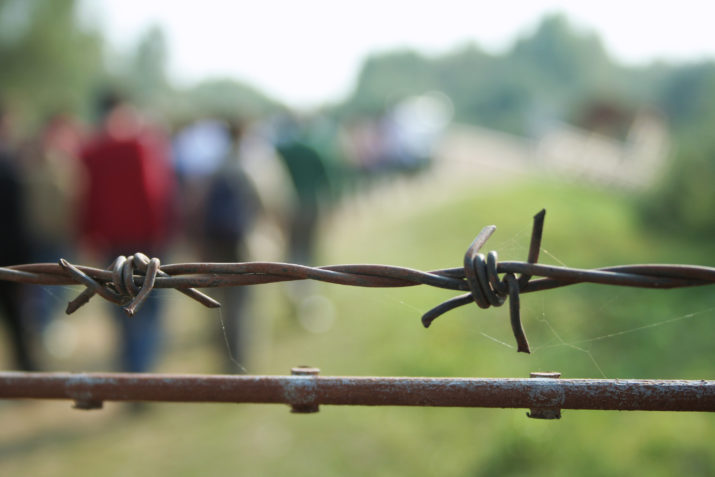
Securitization of Migration and Development Cooperation: An Interview with Ngeti Zwane
This interview is part of the SECUREU network activities
Earlier this year, on July 3-9, 2022, the University of Amsterdam and The Netherlands Institute for Advanced Study in the Humanities and Social Sciences (NIAS-KNAW) hosted a summer school entitled The Securitization of “Undocumented Migrants” and Empowerment Activities of Civil Organisations. This summer school was organized as part of the Jean Monnet project SECUREU (The Securitization of Migrants and Ethnic Minorities and the Rise of Xenophobia in the EU). It explored the role of allies and supporters, such as civil society organisations, acting on behalf of undocumented migrants. Participants had a chance to learn more about the evolution of local and national migration policies in the Netherlands and the program culminated in field research visits to Utrecht, Rotterdam, and Amsterdam. The summer school welcomed students from diverse research backgrounds and in this interview series, we would like to further introduce their perspectives and work. In this interview, we introduce Ngeti Zwane, a Doctoral Candidate at the Department of Political Science, Philipps Universität Marburg in Germany.
– Rusudan Zabakhidze for SECUREU
SECUREU Ngeti, it was a great pleasure to have you as a participant in our summer school. I’d like to start by asking you to tell us a bit about yourself and your background.
Ngeti Zwane I am currently a Doctoral Candidate at the Department of Political Science, Philipps Universität Marburg in Germany. My current research project, funded by the DAAD, is essentially a critical assessment of the EU’s securitization of migration, and examines how the securitization practices following the events of the ‘Migration Crisis’ in 2015 changed the direction of the established development cooperation strategies with sub-Saharan Africa, now centred at “tackling the root causes of irregular migration”. To touch a bit on my personal and professional background; I am Swazi by birth, and was previously affiliated with the Department of Political Sciences at University of Pretoria since the beginning of my studies, where I obtained my bachelor’s degree with honours in International Relations and my masters in Security Studies. I also worked as a part-time lecturer and course coordinator for the Department throughout the duration of my postgraduate studies.
SECUREU Can you share more about your current work and research focus?
Ngeti Zwane I examine the securitization practices and procedures in the articulation of “sub-Saharan migration as a security threat” following the crisis, and decode the causal link between the reviewed securitization processes and the strategic transformation of their development cooperation instruments where security and development continue to be mutually reinforced in migration management. How did it happen? I review the processes leading up to the policy intervention through the all-encompassing financial framework of the European Development Fund, which is responsible for development cooperation strategies between the EU and African, Caribbean and Pacific Group of States, including the Cotonou Agreement (2000-2020) and related development instruments that were introduced after the crisis, such as the European Fund for Sustainable Development and the European Union Emergency Trust Fund (EUTF Africa). The funding mechanisms explored offer empirical explanations for the causal processes investigated as they are responsible for the implementation of development programmes such as the European Consensus on Development, the European External Investment, and the Migration Partnership Framework, dedicated to addressing the root causes of irregular migration.
SECUREU Can you share with our readers what defined your interest to pursue PhD studies and how did you develop your interest in your research themes?
Ngeti Zwane I think it is important to examine the way the security discourses in migration governance are constructed – especially the central role of securitization politics in the EU’s institutional practices on migration management, and their development cooperation agenda with sub-Saharan Africa – in order to understand why the strategy is problematic to achieving sustainable development. In the end, I want to show how the causal elements seen in the new strategies connect, and I hope the research presents new insights into how this strategic shift has hindered their development goals. In the end, I hope we can use these results in recommending how the EU, as its biggest partner, can develop cooperation with sub-Saharan migration issues that is more realistic and sustainable, and considers their contextual peculiarities in order to maximise the available economic opportunities that come with migration.
On how I came to the research interests and current themes: I have always been intrigued by people-centred research, especially human security and state/humanitarian interventions. I can still recall the moment when we all observed the magnitude of the migration influx in 2015. This was all happening at the beginning of my post-grad, and I was immediately invested in the political dynamics and normative questions surrounding the impending migration issue. It just hit home, and my obsession with critical theory and the security practices of states pulled me into the current research focus on securitization discourse and migration governance. I had found my idée fixe and I began visualising what the research project would look like – nothing concrete or outside what we were all witnessing at the time.
Of course, it is one thing having some sketch of an idea for the research and another to frame this rough idea into a coherent research problem statement. This is where my current supervisor, Prof Hubert Zimmermann, helped tremendously. We met about a year before starting the project, whilst on a DAAD financed fact finding mission back in South Africa. We had the opportunity to work together through the initial pitch, and fine tune the ideas and messaging for the proposal that was submitted for the funding application (with the DAAD). This process was compelling for our journey, and he continues to be my biggest supporter, advisor, and most important critic. Everything until now followed from that encounter. Again, this shows the importance of networking.
SECUREU Thank you for sharing your path. I believe your journey will give students aspiring to pursue doctoral studies ideas for how to think ahead and plan their research proposals. Now back to your ongoing research. Our project primarily looks at the EU member states, i.e. the recipients of the undocumented migrants. However, your research offers novel lenses for exploring how the EU-wide securitization of migration is shaping and has shaped EU development policies. What main securitizing trends have you identified and how have they informed the EU development policies towards the sub-Saharan region in recent years?
Ngeti Zwane Yes indeed, it has been fascinating to observe the convergences and variations of our research interests and topics within the unifying themes of securitization processes and third country (irregular or undocumented) migration. One of the main inspirations for my current research was the focus on sub-Saharan migration, as it continues to be a progressive subject matter within the foreign policy initiatives of EU Member States, owing to the exponential increase of migratory flows from the region following the crisis. The research recognizes sub-Saharan Africa’s magnitude within Europe’s proceedings on migration governance and the related securitization processes.
To reflect on some securitization trends that have influenced their development policies following the migration crisis, my theorising activities are based on the EU’s longstanding development partnership with the group of African, Caribbean and Pacific states, and largely reflect on the implementation of the Cotonou Agreement and the subsequent ‘development for migration management’ strategies following the Valletta Summit in 2015. One significant observation worth noting is the progression of political dimension emphasised by the Cotonou Agreement, which declares good governance, democratic reforms and adherence to human rights as a condition for development assistance for the recipient countries – the ‘politicisation of development cooperation’. This criterion essentially means that development support is ‘awarded’ to cooperating countries, and not necessarily to the impoverished ones, thereby attaching conditionality to development cooperation.
The politicisation agenda takes a drastic turn following migration crises as we observe the extreme politicisation (securitization) of their development cooperation following the Valletta Process, where European policymakers committed to the agenda of using development aid to tackle the root-causes of irregular migration amidst the unprecedented arrivals of third-country migrants in Europe. I discuss the direct risks of weaponizing development through the implementation of the exclusive bilateral agreements under the Migration Partnership Framework to individual ‘priority’ countries in sub-Saharan Africa. The short-term bilateral engagements represent a new trend in their collaboration to sustainably manage migration flows. It is still unclear to what extent pursuing this approach serves development objectives in sub-Saharan Africa, as recent literature surrounding the issue reveals that the strategy is problematic in resolving the established development goals. This could be because cooperation on migration management as a condition to development aid calls for the partner countries to cooperate on border control – and this condition is a crucial vulnerability for local communities in the areas affected by border restrictions (e.g., Niger in the Sahel), as more economic gains and opportunities are lost with the restrictions on intra-Africa mobility and migration.
SECUREU What are the main shortcomings of the existing approach and what factors affect the success or failure of these policies?
Ngeti Zwane Critics of the EU’s bilateral agreements in the priority countries argue that these development initiatives have affected the economic activities and opportunities that come with intra-mobility in those regions and fail to contribute to the sustainable economic development of the affected economies. Whereas the holistic approach might be advantageous for middle-income countries in sub-Saharan Africa, it appears to be severely detrimental to low-income countries. Aside from the varying socio-economic dynamics, the distinguishable levels of success can also be attributed to the varying levels of interests, and interrelations with the EU, which influence their cooperation on the matter. Indeed, the research remarks on how the implementation of African-led initiatives has been, for the most part, limited, compared to the EU-led instruments on this issue. The literature notes that the weak implementation on their part is partly because of a lack of political will and commitment at a national level, where restrictions and prevention mechanisms on irregular migration beyond the region are not a key priority in most countries. So, how can we change this in managing the issue at hand? This question, although not the main focus of the study, is an important consideration, as one of my main aspirations was to conduct research that addresses the marginalisation of Africa in global security debates and scholarly works, where Africa has been a restricted agent to its own conversation on security, migration governance and economic development.
SECUREU During the SECUREU summer school in Amsterdam, we covered a wide range of topics. What aspects of the program did you find to be the most interesting to you? How do you plan on applying received knowledge in your own work?
Ngeti Zwane Yes, indeed, I gained insights from the various discussions on securitization, migration governance and the role of civil society organisations acting on behalf of undocumented migrants that I will bring into my own research. Although my analysis is predominantly on the institutional and state-level, the role of non-state actors in migration governance, especially their day-to-day activities in manoeuvring and counteracting securitization policies and practices of the state, has presented points of reflection and comparison. I was very impressed by the various observations from the fieldwork on the two CSOs I visited in Rotterdam, especially the operations and counter securitization initiatives by Stichting ROS.
The proactive strategies of Stichting ROS presented necessary insights in independently establishing means of counteracting the current exclusionary migration policies. I was utterly inspired by their implementation of the Erasmus Passport, which has become a useful counter-securitization tool for undocumented migrants in need of medical attention, who were previously excluded and restricted to such mandatory services by the nature and manner of the migration system. This has been a crucial empowering and enabling tool indeed. I believe such forward-thinking developments are necessary, and we can focus more on building such inclusive strategies in our local communities, particularly as part of efforts to counteract the active restrictions and create empowering avenues as allies and supporters of undocumented migrants in host countries, and local communities.
The CSOs have proved that there is more to be done for vulnerable people by shifting dependency on political mechanisms (or external political bodies in my case) and cooperating as a community to fix the existing structures that would benefit the communities more than what I think is an overreliance on grand development funding. Several studies reveal that the externalised border restrictions have done more harm than good for the people in those regions, and the benefits have been minimal compared to the economic gains that come with intra-Africa labour migration. I learned a lot more than I anticipated from this interaction, and also made astounding connections that I will take with me beyond the summer school. The experience far surpassed my expectations and I hope to continue our learning and networking experience.
SECUREU Thank you, Ngeti, for taking time for this interview and for your valuable contribution to the summer school. On behalf of the SECUREU network, I wish you best of luck with your research.
Ngeti Zwane is a Doctoral Candidate at the Institut für Politikwissenschaft, Philipps Universität Marburg. She holds a BA (Hons.) in International Relations and Master of Security Studies (MSS) from the University of Pretoria, South Africa. Her current doctoral research, funded by the DAAD, is a critical assessment of the EU’s securitization of migration, and examines how the securitization practices and procedures in the articulation of sub- Saharan migration as a security threat following the migration crisis in 2015 changed the direction of their development cooperation relations with sub-Saharan Africa.
Published on November 29, 2022




